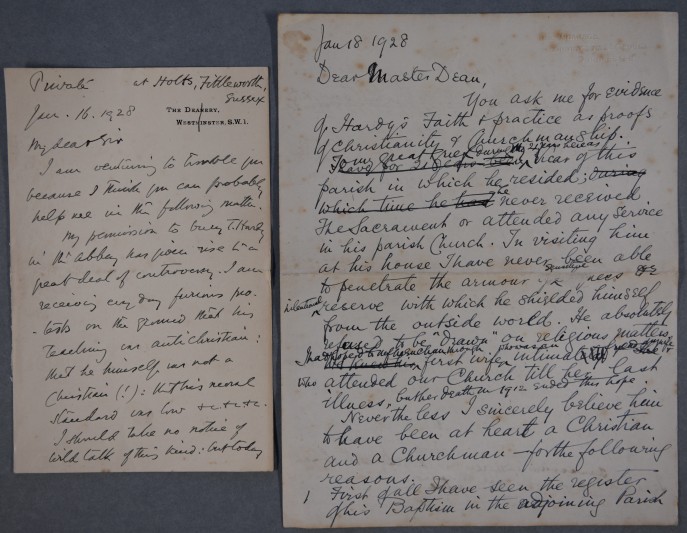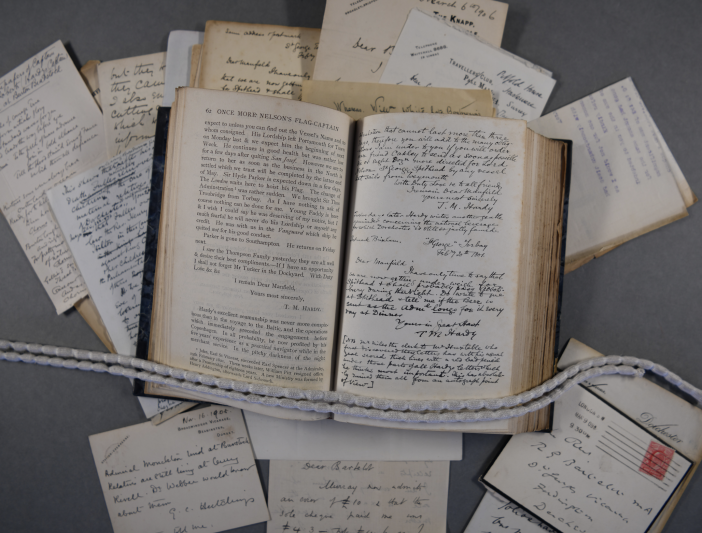Sam Johnston, Service Manager for Archives and Records, writes: Dorset History Centre added to its holdings relating to literary great Thomas Hardy with generous support from FNL. A key acquisition was a letter dated September 1927 by Florence Hardy to a Mr. Lea of Bockhampton portending Thomas Hardy’s death. This documents the deteriorating health of her husband and she tells of a ‘very able London Doctor’ Sir Henry Head who had retired to Dorset and who was being particularly attentive to Hardy. Sir Henry had advised that Hardy ‘ought not to see friends or any callers, two days in succession…[as]…the strain of a long conversation is very bad for his heart’. The letter is poignant in that it was written a little over four months before Hardy’s death on 14 January 1928 of a cardiac-related condition.
The second acquisition is a set of two letters concerning the arrangements of the burial of the author in Poet’s Corner in Westminster Abbey. The exchange is between the Dean of Westminster and the Vicar of Fordingdon, the Reverend Richard Bartelot. The Dean writes to Rev Bartelot that his decision to permit Hardy’s burial in Poet’s Corner ‘has given rise to a great deal of controversy. I am receiving every day furious protests on the ground that his teaching was anti-Christian and that he himself was not a Christian, that his moral standard was very low, etc.’. He goes on to say that having previously ignored the criticism but now he had received a letter from the ‘head of a great religious body’ so felt compelled properly to respond to Hardy’s detractors.
The Reverend Bartelot replied that although convinced of Hardy’s essential Christianity, ‘he had never been able to penetrate the armour’ and that ‘he [Hardy] absolutely refused to be “drawn” on religious matters’. Hardy’s ashes were indeed interred in Westminster Abbey on 16 January 1928. Underscoring Hardy’s undying associations with Dorset, a spadeful of soil, supplied by a local farm labourer, was sprinkled on the casket.
Also purchased was the author’s proof copy of The Three Dorset Captains at Trafalgar by Broadley and Bartelot, published in 1906. The book, subsequently reprinted several times, discusses the contributions at that critical sea battle of Captains Digby, Bullen and Hardy. The volume is particularly significant because it contains annotated changes to the text along with correspondence between the authors as well as a manuscript letter from Thomas Masterman Hardy, Flag Captain of the Victory. Pasted into the front cover is a short note from Nelson himself (signing himself as the ‘Duke of Bronte’) in which he decries the ‘scoundrels’ who attacked the French ambassador’s carriage (1801).
Other items purchased included glass plate negatives of Thomas Hardy and an 18th century book of manuscript hymn tunes compiled by William Knapp of Poole, music based upon folk songs of the day and a rare and interesting find.

